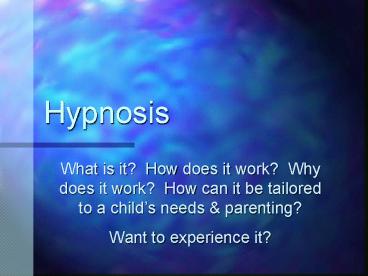Hypnosis - PowerPoint PPT Presentation
1 / 15
Title:
Hypnosis
Description:
... it s a natural state Daydreaming Reading & Movies Driving-Highway Hypnosis In Love The time right ... flight mechanism ... Forensic Hypnotism Pain ... – PowerPoint PPT presentation
Number of Views:143
Avg rating:3.0/5.0
Title: Hypnosis
1
Hypnosis
- What is it? How does it work? Why does it work?
How can it be tailored to a childs needs
parenting? - Want to experience it?
2
David Zarza, Hypnotherapist - Directed Focus
Hypnotherapy
- Practicing Hypnosis since 2004, focusing on
Guided Imagery Personal Empowerment - Studied at Hypnosis Motivation Institute, the
first accredited Hypnotherapy School currently
completing my residency - Certified by the Hypnotherapists Union, Local 472
- Member of the American Hypnosis Association
- BA in Psychology from UCLA
- Currently teach a course at UCLA Community
Health Sciences 179 - Life Skills for College
Women Men
3
Ever been Hypnotized before?
- Yes, its a natural state
- Daydreaming
- Reading Movies
- Driving-Highway Hypnosis
- In Love
- The time right before falling asleep and time
right after waking
4
Brief Hypnohistory
- Franz Mesmer (18th C.), Austrian physician,
called this animal magnetism. - Believed that a mystical force from the hypnotist
was inflicted on the subject inducing them into
this state, hence mesmerism -- to mesmerize. - James Braid (19th C.), Scottish surgeon,
originated the term hypnosis based on hypnos,
which is Greek for sleep. - Theorized that hypnosis is not a force inflicted
by the hypnotist, but a combination of
psychologically mediated responses to suggestions
5
Definition of Hypnosis
- Hypnosis is created by an overload of message
units, disorganizing our inhibitory process
(Critical Mind), triggering our fight-flight
mechanism and ultimately resulting in a
hyper-suggestible state, providing access to the
subconscious mind.
6
Clarifications
- Message Units - Input sent to the brain by the
environment, body, conscious and subconscious
minds. When too many message units are received
(i.e., life-threatening emergency), the result is
a state of anxiety. - Suggestibility - A mental state in which somebody
accepts without question the ides, attitudes, or
instructions of others usually under a state of
hypnosis. - Suggestible via - literal, inferential or self
stated suggestions. - Life Script - The positives and negatives formed
throughout life that become what we know. Thus - What is known is perceived as PLEASURE.
- What is unknown is perceived as PAIN.
7
Theory of Mind
Hypnosis
Houses your logic, reason, will-power
analytical ability.
12
Conscious Mind
Critical Mind
Knowns become your Life Script
Subconscious Mind
88
Primitive Mind
Fight-Flight reflex -Fears of Falling Noises
8
Inducing the Hypnotic Trance
- Prerequisites-
- Desire to be hypnotized
- Belief he/she can be hypnotized
- Allow for comfort relaxation
- Methods-
- Rapid
- Eye fascination
- Progressive relaxation and imagery
- Loss of balance
9
Therapeutic Uses for Hypnosis
- General Hypnotherapy Medical Hypnotherapy
- Stress Relief
- Coping with Loss
- Enhancing Memory Study habits
- Past Life Regression
- Habit control (i.e., Quit Smoking)
- Extinguishing Fears Phobias
- Forensic Hypnotism
- Pain-free Labor Childbirth
- Sports Performance
- Pain Management
- Improving Health
- Weight Control
- Confidence Motivation
10
Hypnobirthing
- Teaches mother to understand and release the
Fear-Tension-Pain Syndrome which so often is the
cause of pain and discomfort during labor.
- Explores the myth that pain is a necessary
accompaniment to a normal birthing. When a
laboring woman's mind is free of fear, the
muscles in her body - including her uterine
muscles - relax, thus facilitating an easier,
stress free birthing. In many cases, first stage
labor shortens, eliminating fatigue during labor
and leaving mother fresh, awake and with energy
for actual birthing.
- Minimizes the need for narcotics during the
birthing process, facilitating a natural bonding
experience for mother/father and child
immediately after the birth. Setting a pleasant
and nurturing space for the family.
11
Working with Children
- More easily hypnotizable than adults because of
very active fantasy lives - Lack of side effects in using hypnosis for pain
or anxiety relief as opposed to medication - Usually very enthusiastic!
- Parental participation soothes enhances their
relationship - Flexibility - hypnosis is portable
- Hope Mastery - if child is in distress, parent
is in distress if child experiences hope
peace, parent does also. Creating a cycle.
12
Child Hypnosis
- What they come in for
- Sports Improvement
- Sibling rivalry
- School test anxiety
- Disciplinary issues
- Weight
- Fears Phobias (MD, DDS, dark, animals)
- Academic/sports scholarship prep pressure
- Bed-wetting, nail-biting, trichotillomania (hair
pulling) - Study skills GPA improvement
- Parenting Re-parenting
13
Erik Eriksons - Psychosocial Developmental Stages
Approx. Age Psychosocial Crisis Description
Birth to 1 year Trust vs. Mistrust Learn to trust or mistrust that others will care for their basic needs-nourishment, sucking, warmth, cleanliness physical contact.
1-3 years Autonomy vs. Shame Doubt Learn to be self sufficient in activities including toileting, feeding, walking and talking or to doubt their own abilities.
3-6 years Initiative vs. Guilt Children want to undertake many adultlike activities, sometimes overstepping the limits set by parents and feeling guilty.
7-11 years Industry vs. Inferiority Children busily learn to be competent and productive or feel inferior and unable to do anything well.
Adolescence Identity vs. Role Confusion Adolescents try to figure out Who am I? They establish sexual ethnic, and career identities or are confused about what future roles to play.
14
Hypnotic Inductions for a Child
- Must build rapport with the child, maybe even
have a playtime with the child before the
hypnosis session - With children, you can use stories to induce them
into hypnosis - Unlike adults, children dont need to close eyes
- Eye fixation techniques work wonderfully!
- Ex. Cloud Car for Pain Relief
15
Lets Get Hypnotized
- Lets go on a mini vacation!































